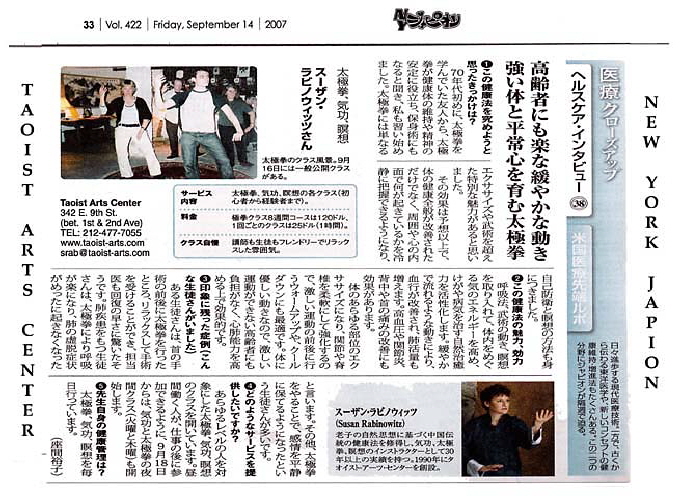|
Tai Chi's low-impact movements improved my circulation and breathing capacity, increased my physical balance. It helped me to be more fully aware of my body and surroundings while developing internal awareness. Tai Chi also taught me self-defense and meditation.
2) Could you explain the appeal and effectiveness of Tai Chi?
In Tai Chi you learn a way to relax and move painlessly, but with real results.
Tai Chi is great by itself or as a warm-up and a cool down from other exercises. Before a strenuous workout, I do it to increase speed, flexibility and awareness. Afterwards I do it to cool down and to center my chi. When I'm feeling low I do it to regain my energy.
Tai Chi is a set of movements, like acupuncture and eastern medicine, that are based on the idea of "Chi" internal energy, the basic life force. Tai Chi develops, circulates and stores Chi. This natural Chi energy can be used to heal injuries and illnesses, for self-defense and meditation and to improve general health.
Tai Chi unifies body, mind and energy and nurtures every part of ourselves. This unification of body, mind and energy is what gives Tai Chi its widely held reputation as an efficient health system that can help us to maintain health, and emotional and spiritual balance, amid the stresses of daily life
Tai Chi has stood the test of time, millions of people practice Tai Chi to keep themselves young in body and mind and have been doing so for thousands of years.
During each practice, every part of the body is exercised. The postures loosen the joints and make the spine stronger and more flexible.
Medical doctors in China, commonly prescribe Tai Chi as therapy for many physical ailments, including high blood pressure, poor circulation, arthritis and back, neck and joint problems. It is one of the finest heart and lung exercises for old people, especially those who are not capable of strenuous exercise. Tai Chi can be practiced by anyone, young or old, athletes or the physically weak.
3) Could you explain some interesting cases, or students you have taught?
A student had neck surgery. He told me that practicing Tai Chi allowed him to be calm and relaxed before and after the surgery and that his doctors were amazed at how quickly he recovered.
Another student who suffered from a lung disease, found that Tai Chi improved her breathing and greatly reduced the effects of her frequent lung collapses.
Many students say emotional problems seem to fade away during and after practicing Tai Chi.
4) What kind of services do you offer to your students at your class?
Tai Chi, Chi Kung and Taoist Meditation classes are taught at the Taoist Arts Center year round.
Qigong (Chi Kung) : Tuesdays and Thursdays at 7:00 p.m.
Tai Chi Chuan: Tuesdays (Beginners) and Thursdays at 8:00 p.m.
Interested? You can receive free information about Taoist Arts Center classes, workshops and events by subscribing to the TAC-INSIDER Mailing List
5) What do you do to take care of your own health?
I practice Tai Chi, Chi Kung and Taoist meditation daily.
6) Tell me a little about yourself and your studio.
The Taoist Arts Center
Established in 1990, The Taoist Arts Center located in New York's East Village is a friendly and relaxed school emphasizing healing, self empowerment and self actualization through Chi Kung (qigong), Tai Chi (taiji) and Meditation.
Susan Rabinowitz
Susan Rabinowitz, founder and director of the Taoist Arts Center in New York City, has practiced and taught qigong, tai chi chuan and Taoist meditation for more than thirty years. A dedicated practitioner of Chinese internal arts, Susan has studied with several leading tai chi and qigong teachers. Susan's approach to the internal arts is based on the Water Method of Lao Tzu, and is based on authentic, traditional health, martial arts and meditation systems of China.
Contact Information:
Susan Rabinowitz, Director
srab@taoist-arts.com
Taoist Arts Center
342 East 9th Street
(between 1st and 2nd Ave)
New York, New York, 10003
Phone: 212-477-7055
|
















